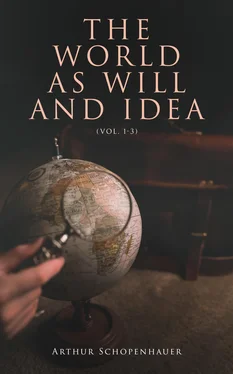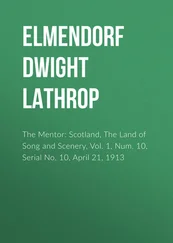From grade to grade objectifying itself more distinctly, yet still completely without consciousness as an obscure striving force, the will acts in the vegetable kingdom also, in which the bond of its phenomena consists no longer properly of causes, but of stimuli; and, finally, also in the vegetative part of the animal phenomenon, in the production and maturing of the animal, and in sustaining its inner economy, in which the manifestation of will is still always necessarily determined by stimuli. The ever-ascending grades of the objectification of will bring us at last to the point at which the individual that expresses the Idea could no longer receive food for its assimilation through mere movement following upon stimuli. For such a stimulus must be waited for, but the food has now come to be of a more special and definite kind, and with the ever-increasing multiplicity of the individual phenomena, the crowd and confusion has become so great that they interfere with each other, and the chance of the individual that is moved merely by stimuli and must wait for its food would be too unfavourable. From the point, therefore, at which the animal has delivered itself from the egg or the womb in which it vegetated without consciousness, its food must be sought out and selected. For this purpose movement following upon motives, and therefore consciousness, becomes necessary, and consequently it appears as an agent, μηχανη, called in at this stage of the objectification of will for the conservation of the individual and the propagation of the species. It appears represented by the brain or a large ganglion, just as every other effort or determination of the will which objectifies itself is represented by an organ, that is to say, manifests itself for the idea as an organ.36 But with this means of assistance, this μηχανη, the world as idea comes into existence at a stroke, with all its forms, object and subject, time, space, multiplicity, and causality. The world now shows its second side. Till now mere will , it becomes also idea , object of the knowing subject. The will, which up to this point followed its tendency in the dark with unerring certainty, has at this grade kindled for itself a light as a means which became necessary for getting rid of the disadvantage which arose from the throng and the complicated nature of its manifestations, and which would have accrued precisely to the most perfect of them. The hitherto infallible certainty and regularity with which it worked in unorganised and merely vegetative nature, rested upon the fact that it alone was active in its original nature, as blind impulse, will, without assistance, and also without interruption, from a second and entirely different world, the world as idea, which is indeed only the image of its own inner being, but is yet of quite another nature, and now encroaches on the connected whole of its phenomena. Hence its infallible certainty comes to an end. Animals are already exposed to illusion, to deception. They have, however, merely ideas of perception, no conceptions, no reflection, and they are therefore bound to the present; they cannot have regard for the future. It seems as if this knowledge without reason was not in all cases sufficient for its end, and at times required, as it were, some assistance. For the very remarkable phenomenon presents itself, that the blind working of the will and the activity enlightened by knowledge encroach in a most astonishing manner upon each other's spheres in two kinds of phenomena. In the one case we find in the very midst of those actions of animals which are guided by perceptive knowledge and its motives one kind of action which is accomplished apart from these, and thus through the necessity of the blindly acting will. I refer to those mechanical instincts which are guided by no motive or knowledge, and which yet have the appearance of performing their work from abstract rational motives. The other case, which is opposed to this, is that in which, on the contrary, the light of knowledge penetrates into the workshop of the blindly active will, and illuminates the vegetative functions of the human organism. I mean clairvoyance. Finally, when the will has attained to the highest grade of its objectification, that knowledge of the understanding given to brutes to which the senses supply the data, out of which there arises mere perception confined to what is immediately present, does not suffice. That complicated, many-sided, imaginative being, man, with his many needs, and exposed as he is to innumerable dangers, must, in order to exist, be lighted by a double knowledge; a higher power, as it were, of perceptive knowledge must be given him, and also reason, as the faculty of framing abstract conceptions. With this there has appeared reflection, surveying the future and the past, and, as a consequence, deliberation, care, the power of premeditated action independent of the present, and finally, the full and distinct consciousness of one's own deliberate volition as such. Now if with mere knowledge of perception there arose the possibility of illusion and deception, by which the previous infallibility of the blind striving of will was done away with, so that mechanical and other instincts, as expressions of unconscious will, had to lend their help in the midst of those that were conscious, with the entrance of reason that certainty and infallibility of the expressions of will (which at the other extreme in unorganised nature appeared as strict conformity to law) is almost entirely lost; instinct disappears altogether; deliberation, which is supposed to take the place of everything else, begets (as was shown in the First Book) irresolution and uncertainty; then error becomes possible, and in many cases obstructs the adequate objectification of the will in action. For although in the character the will has already taken its definite and unchangeable bent or direction, in accordance with which volition, when occasioned by the presence of a motive, invariably takes place, yet error can falsify its expressions, for it introduces illusive motives that take the place of the real ones which they resemble;37 as, for example, when superstition forces on a man imaginary motives which impel him to a course of action directly opposed to the way in which the will would otherwise express itself in the given circumstances. Agamemnon slays his daughter; a miser dispenses alms, out of pure egotism, in the hope that he will some day receive an hundred-fold; and so on.
Thus knowledge generally, rational as well as merely sensuous, proceeds originally from the will itself, belongs to the inner being of the higher grades of its objectification as a mere μηχανη, a means of supporting the individual and the species, just like any organ of the body. Originally destined for the service of the will for the accomplishment of its aims, it remains almost throughout entirely subjected to its service: it is so in all brutes and in almost all men. Yet we shall see in the Third Book how in certain individual men knowledge can deliver itself from this bondage, throw off its yoke, and, free from all the aims of will, exist purely for itself, simply as a clear mirror of the world, which is the source of art. Finally, in the Fourth Book, we shall see how, if this kind of knowledge reacts on the will, it can bring about self-surrender, i.e., resignation, which is the final goal, and indeed the inmost nature of all virtue and holiness, and is deliverance from the world.
§ 28. We have considered the great multiplicity and diversity of the phenomena in which the will objectifies itself, and we have seen their endless and implacable strife with each other. Yet, according to the whole discussion up to this point, the will itself, as thing-in-itself, is by no means included in that multiplicity and change. The diversity of the (Platonic) Ideas, i.e., grades of objectification, the multitude of individuals in which each of these expresses itself, the struggle of forms for matter—all this does not concern it, but is only the manner of its objectification, and only through this has an indirect relation to it, by virtue of which it belongs to the expression of the nature of will for the idea. As the magic-lantern shows many different pictures, which are all made visible by one and the same light, so in all the multifarious phenomena which fill the world together or throng after each other as events, only one will manifests itself, of which everything is the visibility, the objectivity, and which remains unmoved in the midst of this change; it alone is thing-in-itself; all objects are manifestations, or, to speak the language of Kant, phenomena. Although in man, as (Platonic) Idea, the will finds its clearest and fullest objectification, yet man alone could not express its being. In order to manifest the full significance of the will, the Idea of man would need to appear, not alone and sundered from everything else, but accompanied by the whole series of grades, down through all the forms of animals, through the vegetable kingdom to unorganised nature. All these supplement each other in the complete objectification of will; they are as much presupposed by the Idea of man as the blossoms of a tree presuppose leaves, branches, stem, and root; they form a pyramid, of which man is the apex. If fond of similes, one might also say that their manifestations accompany that of man as necessarily as the full daylight is accompanied by all the gradations of twilight, through which, little by little, it loses itself in darkness; or one might call them the echo of man, and say: Animal and plant are the descending fifth and third of man, the inorganic kingdom is the lower octave. The full truth of this last comparison will only become clear to us when, in the following book, we attempt to fathom the deep significance of music, and see how a connected, progressive melody, made up of high, quick notes, may be regarded as in some sense expressing the life and efforts of man connected by reflection, while the unconnected complemental notes and the slow bass, which make up the harmony necessary to perfect the music, represent the rest of the animal kingdom and the whole of nature that is without knowledge. But of this in its own place, where it will not sound so paradoxical. We find, however, that the inner necessity of the gradation of its manifestations, which is inseparable from the adequate objectification of the will, is expressed by an outer necessity in the whole of these manifestations themselves, by reason of which man has need of the beasts for his support, the beasts in their grades have need of each other as well as of plants, which in their turn require the ground, water, chemical elements and their combinations, the planet, the sun, rotation and motion round the sun, the curve of the ellipse, &c., &c. At bottom this results from the fact that the will must live on itself, for there exists nothing beside it, and it is a hungry will. Hence arise eager pursuit, anxiety, and suffering.
Читать дальше












